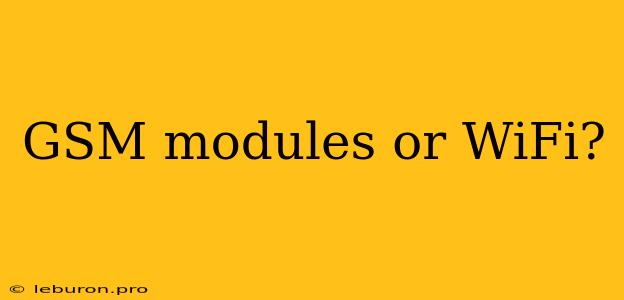In the realm of connected devices, the choice between GSM modules and WiFi for communication presents a critical decision point. Both technologies offer distinct advantages and drawbacks, necessitating a careful evaluation of project requirements to determine the optimal solution. This article delves into the intricacies of GSM modules and WiFi, examining their respective strengths, limitations, and best use cases. By understanding the nuances of each technology, developers and engineers can make informed decisions that align with their specific project needs.
GSM Modules: A Cellular Connection
GSM modules, short for Global System for Mobile Communications, leverage the ubiquitous cellular network to establish communication links. These modules are essentially miniature cellular phones embedded within devices, enabling them to send and receive data via SMS, voice calls, and even internet connectivity. The widespread availability of GSM networks across the globe makes them a highly reliable and accessible option for a diverse range of applications.
Advantages of GSM Modules
- Ubiquitous Coverage: GSM networks are deployed across vast geographical areas, ensuring wide coverage and the ability to communicate from remote locations.
- Reliability: Cellular networks are designed for robust communication, providing a reliable and stable connection even in challenging environments.
- Long-Range Communication: GSM modules can establish connections over significant distances, exceeding the range of WiFi networks.
- Data and Voice Communication: GSM modules support both data transmission and voice calls, offering a comprehensive communication solution.
- Power Efficiency: Modern GSM modules are optimized for low power consumption, extending battery life in battery-powered devices.
Disadvantages of GSM Modules
- Cost: GSM modules can be more expensive than WiFi modules, especially when considering data plans and cellular service fees.
- Data Rates: GSM networks typically offer lower data rates compared to WiFi, especially in areas with limited network infrastructure.
- Security Concerns: GSM networks can be susceptible to security threats, requiring robust encryption protocols to protect sensitive data.
- Limited Bandwidth: Cellular networks have a limited bandwidth capacity, potentially hindering performance in applications requiring high data throughput.
WiFi: A Wireless Network Standard
WiFi, short for Wireless Fidelity, utilizes radio waves to establish wireless connections between devices within a defined area. This technology has become ubiquitous in homes, offices, and public spaces, providing convenient and high-speed internet access. WiFi networks operate on a range of frequencies, including 2.4 GHz and 5 GHz, offering different levels of performance and range.
Advantages of WiFi
- High Data Rates: WiFi networks can achieve significantly higher data transfer speeds compared to GSM modules, ideal for applications requiring large data volumes.
- Cost-Effectiveness: WiFi modules are generally less expensive than GSM modules, with no ongoing service fees or data plans.
- Low Power Consumption: WiFi devices consume less power than GSM modules, extending battery life in mobile devices.
- Easy Setup and Configuration: WiFi networks are relatively easy to set up and configure, making them accessible to users of all skill levels.
Disadvantages of WiFi
- Limited Range: WiFi networks have a limited range compared to GSM modules, requiring proximity to a router or access point.
- Interference: WiFi signals can be susceptible to interference from other wireless devices and environmental factors, affecting signal strength and stability.
- Security Risks: WiFi networks can be vulnerable to security threats, necessitating robust security measures like strong passwords and encryption.
- Indoor Use Primarily: WiFi is primarily designed for indoor use, with limited coverage in outdoor environments.
Choosing the Right Technology: GSM Modules or WiFi?
The decision between GSM modules and WiFi ultimately depends on the specific requirements of your project. Consider the following factors:
- Connectivity Requirements: If your device needs to communicate from remote locations with limited or no WiFi access, GSM modules are the ideal choice.
- Data Rates: For applications requiring high data transfer speeds, WiFi offers a superior solution.
- Cost and Budget: WiFi modules are more cost-effective than GSM modules, while cellular service fees and data plans can add to the overall cost of using GSM.
- Range and Coverage: GSM modules excel in long-range communication, while WiFi networks have limited range but offer excellent performance within a defined area.
- Security Concerns: Both technologies have potential security risks, requiring appropriate measures to protect sensitive data.
Case Studies
- Smart Home Devices: Home automation systems commonly utilize WiFi for communication due to its low cost, high data rates, and ease of setup. However, for devices requiring remote monitoring or control, GSM modules can provide reliable connectivity even in areas with limited WiFi access.
- IoT Applications: Internet of Things (IoT) devices often rely on WiFi for local communication, while GSM modules are essential for applications involving data collection from remote sensors or asset tracking.
- Telematics: Telematics systems in vehicles leverage GSM modules for tracking, remote diagnostics, and emergency services. WiFi may be used for in-vehicle entertainment or data sharing within the vehicle network.
Conclusion
The choice between GSM modules and WiFi is a crucial decision for developers and engineers seeking to integrate communication capabilities into their projects. Both technologies offer distinct advantages and disadvantages, necessitating a careful evaluation of project requirements. Ultimately, the best solution depends on the specific application, balancing factors such as connectivity needs, data rates, cost, range, and security. By understanding the nuances of each technology, developers can select the optimal approach for their project, ensuring reliable and efficient communication.
